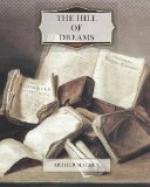sudden blaze and illumination as the fire was poked
up so that it might be cheerful for father; these
trivial and common things were acutely significant.
They brought back to him the image of a dead boy—himself.
They recalled the shabby old “parlor”
in the country, with its shabby old furniture and fading
carpet, and renewed a whole atmosphere of affection
and homely comfort. His mother would walk to
the end of the drive and look out for him when he
was late (wandering then about the dark woodlands);
on winter evenings she would make the fire blaze,
and have his slippers warming by the hearth, and there
was probably buttered toast “as a treat.”
He dwelt on all these insignificant petty circumstances,
on the genial glow and light after the muddy winter
lanes, on the relish of the buttered toast and the
smell of the hot tea, on the two old cats curled fast
asleep before the fender, and made them instruments
of exquisite pain and regret. Each of these strange
houses that he passed was identified in his mind with
his own vanished home; all was prepared and ready
as in the old days, but he was shut out, judged and
condemned to wander in the frozen mist, with weary
feet, anguished and forlorn, and they that would pass
from within to help him could not, neither could he
pass to them. Again, for the hundredth time,
he came back to the sentence: he could not gain
the art of letters and he had lost the art of humanity.
He saw the vanity of all his thoughts; he was an ascetic
caring nothing for warmth and cheerfulness and the
small comforts of life, and yet he allowed his mind
to dwell on such things. If one of those passers-by,
who walked briskly, eager for home, should have pitied
him by some miracle and asked him to come in, it would
have been worse than useless, yet he longed for pleasures
that he could not have enjoyed. It was as if he
were come to a place of torment, where they who could
not drink longed for water, where they who could feel
no warmth shuddered in the eternal cold. He was
oppressed by the grim conceit that he himself still
slept within the matted thicket, imprisoned by the
green bastions of the Roman fort. He had never
come out, but a changeling had gone down the hill,
and now stirred about the earth.
Beset by such ingenious terrors, it was not wonderful
that outward events and common incidents should abet
his fancies. He had succeeded one day in escaping
from the mesh of the streets, and fell on a rough and
narrow lane that stole into a little valley.
For the moment he was in a somewhat happier mood;
the afternoon sun glowed through the rolling mist,
and the air grew clearer. He saw quiet and peaceful
fields, and a wood descending in a gentle slope from
an old farmstead of warm red brick. The farmer
was driving the slow cattle home from the hill, and
his loud halloo to his dog came across the land a
cheerful mellow note. From another side a cart
was approaching the clustered barns, hesitating, pausing
while the great horses rested, and then starting again




